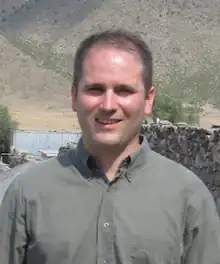Mark A. Moyar | |
|---|---|
 | |
| Born | May 12, 1971 Cleveland, Ohio, U.S. |
| Academic background | |
| Education | Cambridge University, Ph.D. |
| Alma mater | Harvard University Cambridge University |
| Academic work | |
| Discipline | Military history |
| Institutions | Hillsdale College Center for Strategic and International Studies |
| Website | www |
Mark A. Moyar (born May 12, 1971) is the former Director of the Office for Civilian-Military Cooperation at the US Agency for International Development.[1] He currently serves as the William P. Harris Chair of Military History at Hillsdale College.[2] He served previously as the Director of the Project on Military and Diplomatic History[3][4] at the Center for Strategic and International Studies, and has been a Senior Fellow at the Foreign Policy Research Institute[5] and a member of the Hoover Institution Working Group on the Role of Military History in Contemporary Conflict.[6]
Early life
Moyar was born May 12, 1971, in Cleveland, Ohio to Bert and Marjorie Moyar. He graduated from Hawken School in Gates Mills, Ohio in 1989.
Education
Moyar holds a B.A. summa cum laude in history from Harvard University and a Ph.D. in history from Cambridge University. While a student at Harvard, he wrote for the conservative student newspaper The Harvard Salient. He also played saxophone in the Harvard Jazz Band with legendary saxophonist Joshua Redman.
Accomplishments
His articles on historical and current events have appeared in The New York Times, The Wall Street Journal, and The Washington Post. During his time as a Senior Fellow at the Joint Special Operations University (2013-2015), he published three lengthy studies on special operations—in Colombia, Afghanistan, and Mali: Village Stability Operations and the Afghan Local Police (2014),[7] Countering Violent Extremism in Mali (2015),[8] and Persistent Engagement in Colombia (2014) [9]
Moyar is the author of the 2006 book Triumph Forsaken: The Vietnam War, 1954–1965. In it he argues that Ngo Dinh Diem was an effective leader. Moyar states that supporting the November 1963 coup was one of the worst American mistakes of the war. The other biggest mistakes according to Moyar were: the failure to cut the Ho Chi Minh trail, and the United States Congress' refusal to support the South Vietnamese government after the 1973 Paris Peace Accords were violated, and the refusal of emergency aid to South Vietnam near the end of the war.
Triumph Forsaken caused a great stir and many opinionated reviews, some negative, as well as some positive. In response to the reactions engendered by the book, Andrew Wiest and Michael J. Doidge edited Triumph revisited : historians battle for the Vietnam War (2010),[10] a collection of detailed reviews of the book by 15 different academic historians. The reviews are attached to responses by Moyar, who challenges the criticism of his work.
Books
- Phoenix and the Birds of Prey: The CIA's Secret Campaign to Destroy the Viet Cong (1997) ISBN 1-55750-593-4
- Republished in 2007 as Phoenix and the Birds of Prey: Counterinsurgency and Counterterrorism in Vietnam with a foreword by Harry Summers and a new preface and chapter; ISBN 0-8032-1602-5
- Triumph Forsaken: The Vietnam War, 1954–1965 (2006) ISBN 0-521-86911-0
- A Question of Command: Counterinsurgency from the Civil War to Iraq (2009) ISBN 0-300-15276-0
- Strategic Failure: How President Obama's Drone Warfare, Defense Cuts, and Military Amateurism Have Imperiled America (2015) ISBN 1-4767-1324-3
- Aid for Elites: Building Partner Nations and Ending Poverty through Human Capital (2016) ISBN 978-1-107-12548-3
- Oppose Any Foe: The Rise of America’s Special Operations Forces (2017) ISBN 978-0465053933
- Triumph Regained: The Vietnam War, 1965-1968 (2022) ISBN 978-1641772976
References
- ↑ "Symposium". Center For Leadership and Ethics. Retrieved 23 June 2019.
- ↑ Staff Report. "Hillsdale College welcomes 21 new faculty, eight new endowed chairs". Hillsdale Daily News. Hillsdale College. Retrieved 10 September 2021.
- ↑ "Mark Moyar". www.csis.org. Archived from the original on 8 December 2017. Retrieved 7 December 2017.
- ↑ Schwartz, H. Andrew. "Mark Moyar Joins CSIS as Director of the Military and Diplomatic History Project". Center For Strategic & International Studies. CSIS. Retrieved 31 July 2017.
- ↑ "Mark Moyar". Foreign Policy Research Institute. Retrieved 19 June 2015.
- ↑ "Hoover Institution Research Groups". Hoover Institution. Stanford University. Retrieved 31 July 2017.
- ↑ Moyar, Mark. "Village Stability Operations and the Afghan Local Police". Joint Special Operations University Library. JSOU. Archived from the original on 17 February 2020. Retrieved 31 July 2017.
- ↑ Moyar, Mark. "Countering Violent Extremism in Mali". Joint Special Operations University Library. JSOU. Archived from the original on 17 February 2020. Retrieved 31 July 2017.
- ↑ Moyar, Mark. "Persistent Engagement in Colombia". Joint Special Operations University Library. JSOU. Archived from the original on 17 February 2020. Retrieved 31 July 2017.
- ↑ Wiest, Andrew; Doidge, Michael (2010). Triumph Revisited: Historians Battle for the Vietnam War. London: Routledge. ISBN 9781136974229. Retrieved 7 December 2017.
External links
- Book website
- Appearances on C-SPAN
- Interview on A Question of Command at the Pritzker Military Museum & Library
- Interview on "Triumph Forsaken: The Vietnam War, 1954-1965" on History News Network
- Triumph Forsaken Roundtable h-diplo Roundtable Review